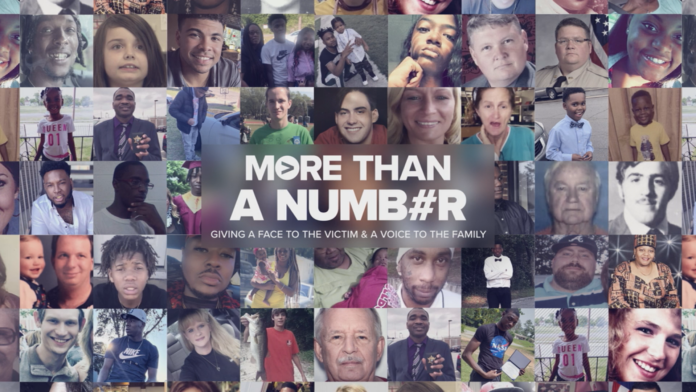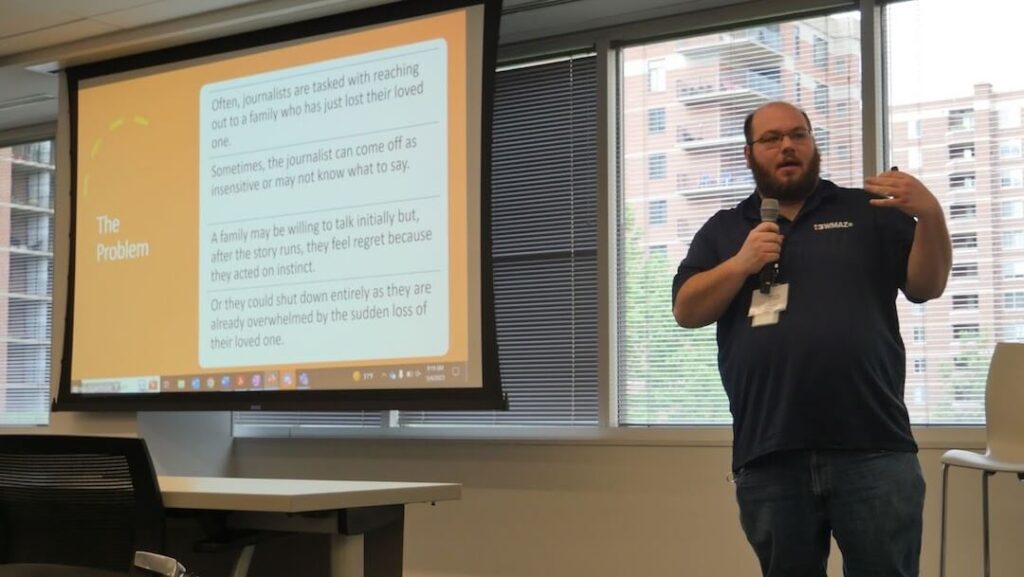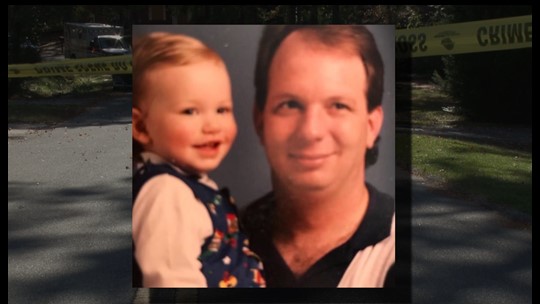
In November 2017, journalist Justin Baxley was facing the unthinkable. His father, Michael Baxley, had been shot and killed at age 53 during a robbery at his home.
Amid his grief and heartbreak, Baxley had actions to take and decisions to make, but he had little help navigating the homicide’s aftermath. In addition, a difficult situation was made even harder by constant media requests for interviews, he said.
Six years later as the search for his father’s killer continues, Baxley is providing support to others dealing with tragedy and working to change the way journalists interact with victims’ families. The Mercer University alumnus’s award-winning project, “More Than a Number,” provides an online platform for families to find essential resources and memorialize their loved ones.
“What I wanted to do is meet the intersection of the job that I’m doing and also the thing that I went through that hurt me the most and try to fix that problem,” he said.
Baxley, a 2017 journalism graduate and now the digital content manager for Macon-based television station 13WMAZ, whose parent company is TEGNA Inc., developed the project as a 2022-23 Poynter-Koch Media and Journalism Fellow. Each year, the fellowship is awarded to about 60 rising journalists who are tasked with developing projects aimed at bettering newsrooms or communities.
Baxley said the idea for a simpler version of the project came to him a long time ago, but the fellowship pushed him to expand upon it and turn it into a reality. He was later awarded one of the fellowship’s top two prizes for his project.
“It’s one of the best things that ever happened to me as a journalist,” Baxley said of the fellowship. “For somebody who kind of questions whether I’m making a difference or if I’m a good journalist, this definitely gave me a lot of confidence. It was a wonderful experience.”

Baxley said he received immediate support for his project from 13WMAZ, which houses all of the “More Than a Number” content on its website. The site is continually updated with resources and stories.
“My dad is why I’m doing this. It was easily one of the worst days of my life. It was a very traumatic experience that was made worse by the news reporting process,” said Baxley, who learned of his father’s death from reporters and saw news outlets get many of the facts wrong. “You’re talking about something that happens immediately that you don’t plan for. It’s the most abrupt tragedy that you can think of.”
Baxley hopes “More Than a Number” will help change the way journalists interact with families and give families more power. After his father’s death, news outlets kept asking him to talk when he wasn’t ready, he said. Victims’ families may never be ready, so “More Than a Number” offers a gentler alternative that allows them to still pay tribute to their loved ones.
Using an online family form, they can share information, favorite memories and photos, and indicate if they would like to be interviewed. This provides journalists with information they can use to tell the personal stories of the victims, even if the family decides they never want to go on camera. “More Than a Number” also has three online memorial pages — one for 2023, one for 2022 and one for older cases — for Central Georgia homicide victims.
The project’s goal is “to give a face to the victim and a voice to the family,” according to its tagline. Baxley said news stories often get caught up in the numbers when it comes to homicides, reporting that a death is the 29th in the area this year, for example. But sharing details about the victims’ lives and personalities helps to humanize them and forge connections in the community. These stories can also lead to tips that could help solve cases.
“(This approach) removes that feeling as a reporter that you have to go get that story, and you’re some sort of journalism robot,” Baxley said. “We’re covering it because we care, and we want to make a difference, but I think sometimes because of how the process has always worked, it’s forced journalists to some degree to be less human and to reach out and try to get these families to talk and be really pushy, which has led to trauma on both sides.”
Baxley said he cleaned up the area in the house where his dad was killed, something no one should have to do. Only later did he learn that there are companies that provide this service and resources available to help with funeral costs, groceries and counseling services. So, Baxley compiled this information and more in the Victim’s Resource Guide to help families navigate their next steps and understand their rights.

“It’s just a huge weight that could be lifted off of these families,” he said. “You can have all the resources to get through the first few weeks, months. We’re going on six years of my dad’s case being unsolved, and there are still things that the resource guide can provide me.”
“More Than a Number” cards with QR codes have been distributed to law enforcement agencies and other organizations throughout Central Georgia, so they can be passed out to families who need them.
Baxley said people are becoming familiar with the “More Than a Number” tagline and starting to reach out with their stories. Recently, 13WMAZ published stories in the series about a mother still seeking answers in her son’s 2009 death and a father of nine who was shot to death. The project is being expanded to include victims beyond homicides, such as from car accidents and severe weather.
“We’re now seeing it in action, and people are responding to it. The community wants this type of coverage,” Baxley said. “They want to be able to remember these people. When somebody is killed in our community, we’ve lost a piece of the fabric that makes this community. We’ll never get that back. For us, this is about showcasing those threads, showcasing those people. We may never get them back, but that doesn’t mean we have to forget who they were.”
Baxley said the compassionate approach of the “More Than a Number” initiative has meant a lot to local residents, as well as the fact that a news outlet is putting aside years of common journalistic practice.
“Now, (families are) seeing that we’re not prioritizing our own personal gains. We’re prioritizing them. To hear that from those families, it really does mean a lot. As long as these families are receptive to it, that’s the reward that I get out of it at the end of the day. I’m from Macon. This community matters to me. To be able to do it in my hometown, in the town where I lost my dad, it matters more. To be able to make that difference.”
As an intern at The Telegraph, Baxley began reporting on crime before his father died. In 2016, he worked on a story about a 1995 cold case with two veteran reporters and talked with the two victims’ families. They later commended Baxley for capturing the essence of their loved ones. After his father died, one of the first people Baxley called was the mother of one of the two victims.
“I’ll never forget that act of kindness from her,” Baxley said. “She cried with me and told me that it was going to be all right and still checks on me to this day. My goal is to try to be that for many people. At the end of the day, that’s the biggest inspiration. It’s not just for my dad; it’s for all these victims, all these families out there. Those are the people that keep me going. Those are the folks I want to serve with this project. We’re a part of this really awful connection. Nobody wants to have the connection that we have. But why not be a beacon for those folks who are having to go through it?”









